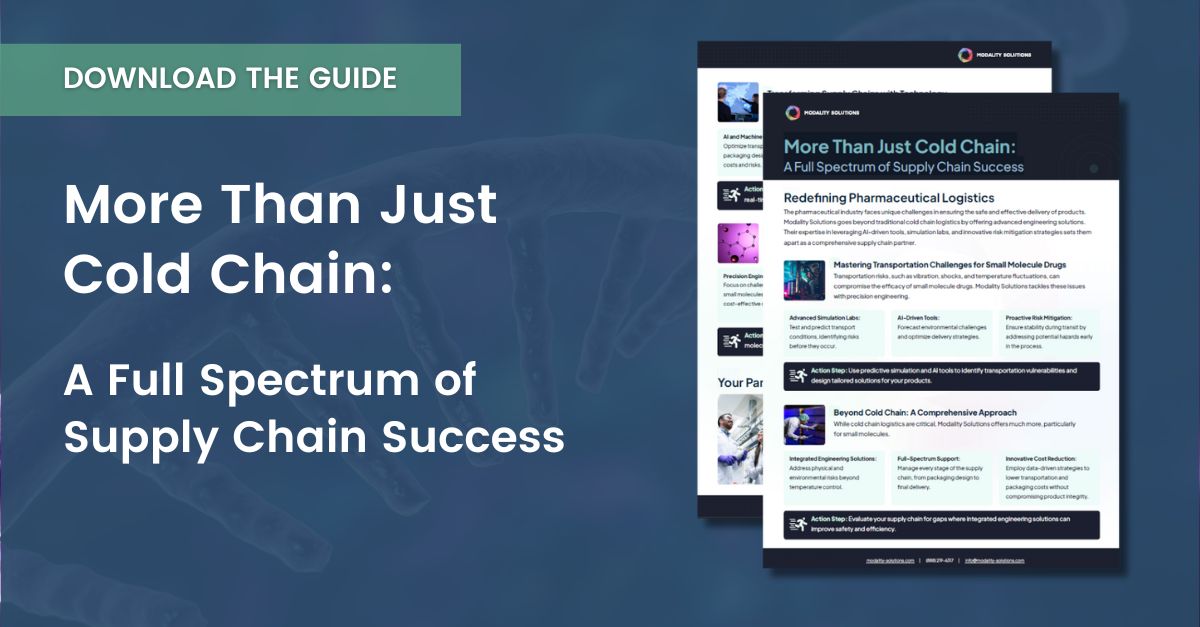No Temperature Controls Necessary For Small Molecules? Are You Sure?
Ensuring Quality for Small Molecule Therapy Supply Chains in a Growing Market Managing the...
read Details

First published on June 29, 2016 on Cold Chain IQ – as a contributor, Hutchinson’s column, Global Cold Chain Connections, falls in the Supply Chain & Security category. It can also be viewed at http://www.coldchainiq.com/clinical-supply/columns/case-study-meeting-cold-chain-logistics-challenges
Highly sensitive cold chain clinical trial products demand operational excellence. Variations in temperature can void a shipment and lead to millions in loss for the manufacturers as well as dramatically raise the costs of the trials. The need for reliable and environmentally controlled cold chain solutions is more critical than ever. Quality cold chain management reduces risk and includes thermal package engineering, data collection / monitoring, and global transportation logistics’ experience to ensure medical treatments maintain their efficacy and safely reach the patient. In addition, during distribution a temperature excursion can also affect the overall data generated for the clinical trial evaluation.
Clinical trial material (CTM) or investigational medicinal products (IMP) are an important part of the early stages of the life science supply chain. As trials are being run on a global scale, in markets with less than ideal infrastructure, there is a dire need for companies to work with specialized cold chain experts to engineer and design innovative distribution processes.
Cold chain failure may lead to: the patient being administered an unsafe product; liability based on compliance infractions; inconsistent data results; or an entire shipment’s product integrity could be rejected by the quality department, resulting in costly delays.
The industry has progressed from shipping “as usual” to exacting controls on products in-transit with proof of custody at the final destination. Control and documentation for the storage, handling and distribution of temperature-sensitive products is best addressed with comprehensive shipping qualification.
When biopharmaceutical companies partner with providers and consultants that specialize in the packaging, shipping, distribution, delivery, and monitoring of temperature-sensitive vaccines, clinical trial logistics operations can be streamlined and be more effective for all concerned.
One such example is that of a life-saving CDC-sponsored clinical trial operation for the Ebola vaccination. In April 2015, Daniel “Dan” Littlefield, a co-founder and principal of Modality Solutions, traveled to Sierra Leone, West Africa to provide operational and technical support for the first Ebola outbreak to reach epidemic proportions. Dan trained and worked hand-in-hand with another Modality Solutions project employee, Judy Tempel and local staff at three locations, as well as with our partners FHI360, the CDC and BARDA. The project was funded in whole or in part with Federal funds from the U.S. Department of Health and Human Services, Office of the Assistant Secretary for Preparedness and Response, Biomedical Advanced Research and Development Authority.
One such example is that of a life-saving CDC-sponsored clinical trial operation for the Ebola vaccination. In April 2015, Daniel “Dan” Littlefield, a co-founder and principal of Modality Solutions, traveled to Sierra Leone, West Africa to provide operational and technical support for the first Ebola outbreak to reach epidemic proportions. Dan trained and worked hand-in-hand with another Modality Solutions project employee, Judy Tempel and local staff at three locations, as well as with our partners FHI360, the CDC and BARDA. The project was funded in whole or in part with Federal funds from the U.S. Department of Health and Human Services, Office of the Assistant Secretary for Preparedness and Response, Biomedical Advanced Research and Development Authority.
Modality Solutions’ clinical trial operation services include: ongoing monitoring, staff training, data query resolution, drug supply accountability, and regulatory document preparation, review and collection. Every member of our team works to maximize clinical trial performance, clinical excellence, data integrity, and patient safety.
With less than two weeks’ notice, Dan worked to use controlled environment logistics for a very difficult vaccine. He knew he’d be working in a complex Zone 4 emerging market environment. The vaccine had a temperature storage requirement of less than minus 60 degrees Centigrade in a location without a reliable infrastructure of water and electricity.
Dan, an expert in cold chain logistics, with his on-site assembled team, helped coordinate the vaccination of 8,650 healthcare and other frontline workers including: doctors and nurses; cleaning, laboratory, pharmacy, security, and administrative health facility staff; ambulance teams; workers responsible for swabbing deceased people; surveillance teams; and burial workers. In this effort, Dan and his team members were dealing with the potential for issues discussed earlier (namely unsafe product and patient danger) if they did not maintain utmost consistency in their cold chain management.
To assess such risk, Dan initially applied the use of appropriate Six Sigma tools, including statistical analysis, process mapping, and GDP and risk assessment to identify potential issues. When it came to risk analysis, Dan initiated a ground-breaking strategy drawn from his previous experience. Rather than doing the typical Failure Mode Effect Analysis (FMEA), he called for using a Hazard and Operability Analysis (HAZOP). The HAZOP risk analysis focuses on essentials like running water, electricity, and Internet.
Recognizing the limitations early, Dan used his engineering skills to import into the country of Sierra Leone items to build the cold chain. The Ebola vaccine had to be reconstituted, then stored and shipped from the depot to the field sites with monitored refrigerated temperatures the entire time. Using specialized packaging and modern technology, Dan put together a holistic cold chain management approach. He demonstrated what we talk about as far as integrating the cold chain management system with processes and procedures, risk assessment, modern technologies, training the partner, and packaging qualification. He put it all together very quickly without missing a beat. As a result, no vaccine was lost to temperature excursion.
With the common goal of providing the correct pharmaceutical product safely, clinical supply chain partners have to ensure that items like medications are carefully monitored throughout the supply chain process. Achieving the right conditions through various global conditions, which often change with unexpected weather or problems along the way, requires a deep understanding of not only the regulatory environment of the bio-pharmaceutical market but also the local requirements and at-point options during transport and clinical trials. Handling, storing, and distributing such temperature-sensitive items relies heavily on the individuals who understand the regulations in the big picture and can also meticulously engineer solutions for the product to maintain those standards in complicated or less-than-desirable situations.
Ensuring Quality for Small Molecule Therapy Supply Chains in a Growing Market Managing the...
read Details
Ensuring the safe, effective delivery of small molecule drugs is more challenging than ever....
read Details
At a Glance: Cold Chain Engineering: Modality Solutions focuses on enhancing drug delivery through...
read Details